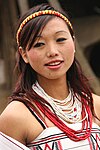Biate language
| Biate | |
|---|---|
| Biete | |
| Region | India |
| Ethnicity | Biate |
Native speakers | (19,000 cited 1997)e25 35,000 (2021)[citation needed] |
| Latin | |
| Language codes | |
| ISO 639-3 | biu |
| Glottolog | biet1238 Biete |
The Biate language, also known as Biete language, is a Sino-Tibetan language spoken by the Biete people in several parts of northeast India.[1] Biate is pronounced as Bia-te (the e in te pronounced as "a").
Geographical distribution[edit]
Biate is spoken in the following locations (Ethnologue).
- Assam: Dima Hasao District and Cachar district
- Meghalaya: West Jaintia Hills, East Jaintia Hills and East Khasi Hills district
- Manipur: Churachandpur district
- Mizoram: Aizawl district
- Tripura: Jampui Hills
Basic vocabulary[edit]
| Biate | Meaning |
|---|---|
| Im ne riming? | What is your name? |
| Ke riming chu Thiangchonsinga | My name is Thiangchonsinga |
| Ki lôm (ki-lôm) | Thank You |
| Ni damim? | How are you? |
| Ki dam | I am fine |
| Tui | Water |
| Phâivua | Air |
| Bu | (cooked) rice |
| Inga(sa) | fish (meat) |
| Ar(sa) | chicken(meat) |
| Voksa | pork |
| Sialsa | beef |
| Kêlsa | mutton |
| Thlâichi | vegetable |
| Dal | lentils |
| Chial(Chi-al) | salt |
| Chithlum(Chi-thlum) | sugar |
| Aroi | less |
| Marcha | chilli |
| Ne peh nôk roh | Please give again (serve again). |
| A inrup | enough |
| Tui ne peh roh | Please give water. |
| Bu ne peh roh | Please give food (rice). |
| An ne peh roh | Please give (side dish) vegetable / meat. |
| Im nang ki pek rang? | Give what? |
| Im? | What? |
| Tikinta? | When? (past) |
| Tikinim? | When? (future) |
| Taka'm / tak tiangim? | Where? |
| Ingkanim? | How? |
| Mangṭha. | Sleep well. (The equivalent of "Good Night".) |
| Ingkanim ki fe rang Mualsei? | How do I go to Mualsei? |
| Izaka'm a man Epu / Epi? | What is the price of this? (Epu is masculine gender, Epi is feminine gender) |
| Lôm takkan fe roh. | Happy journey |
Numbers[edit]
| 0 | Hual |
| 1 | Khatka |
| 2 | Nika |
| 3 | Thumka |
| 4 | Lika |
| 5 | Ringaka |
| 6 | Rukka |
| 7 | Sarika |
| 8 | Riatka |
| 9 | Kuakka |
| 10 | Somka |
| 20 | Sominika |
| 30 | Somithumka |
| 40 | Somilika |
| 50 | Somringaka |
| 60 | Somrukka |
| 70 | Somsarika |
| 80 | Somriatka |
| 90 | Somkuakka |
| 100 | Rizaka |
| 200 | Rizanika |
| 300 | Rizathumka |
| 400 | Rizalika |
| 500 | Rizaringaka |
| 600 | Rizarukka |
| 700 | Rizasarika |
| 800 | Rizariatka |
| 900 | Rizakuakka |
| 1000 | Sangka |
| 10000 | Sîngka |
| 100000 | Nuaika |
| 1000000 | Dâpka |
| 10000000 | Mit-en |
| 100000000 | Thlîr |
| 1000000000 | Vânnuaidâp |
References[edit]
- ↑ Lalsim, R. (2005). Tribes of N.C.Hills, Assam. Assam: Cultural and Publicity Officer. pp. 61–105.
